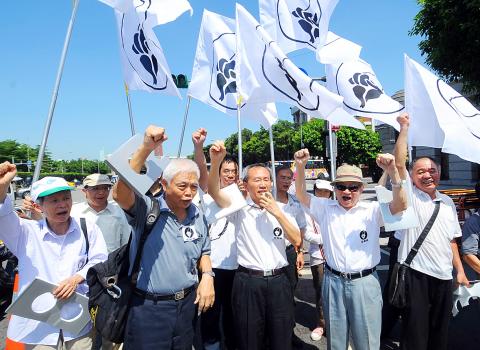
Since the DPP is pro-Taiwan but also tends to the left, Taiwan could ultimately use a pro-Taiwan party on the right. It is not yet clear what the TNP will become. The name has its good points. Changing the English translation of 台灣民族黨 to "Taiwan National Party" instead of "Taiwanese ..." will help point journalists towards focus on a country rather than them assuming this party is an organization of a supposed "separatist" ethnic group.
It is good that this party seems to be looking outwardly to learn from the experience of other nations, such as Estonia. If the party can form itself into an effective organization, it can be a good influence internationally. Imagine a reporter in Europe sitting down to talk with a representative of the "Taiwan National Party" versus a chat with the "Democratic Progressive Party." The former's name is unequivocal in its clear declaration of Taiwan as a nation. The official name of the latter could be more easily ignored by those with a one-China habit. They would just relegate it to a democratizing party in China.
One other thing to note: what are the demographics of the party? Can the TNP reach out to the younger generation?
Perhaps the best outcome of Taiwan having small parties could be if they can engage and mobilize a segment of the population that had been feeling marginalized. Taiwan needs more active and organized pro-Taiwan groups.
We need them to not just focus on the political process of getting candidates elected, but, at this crucial juncture in Taiwan's history, focus on reaching and educating the younger generation. Do not leave them to the propaganda of the KMT-derived education system, on the whole as of yet untouched by the democratic ideological transformation in Taiwan.
============================================
See Taipei Times Article below:
A group of pro-Taiwan independence supporters yesterday announced the formation of a new political party, the Taiwanese National Party (TNP, 台灣民族黨).
The party, to be officially established tomorrow, will seek independence for Taiwan through a national referendum.
A group of TNP members made the announcement on Ketagalan Boulevard in Taipei with the Presidential Office in the background, chanting the slogans “Long live the Taiwanese nation” and “Liberate the Taiwanese nation.”
“We are determined to resort to every possible method to achieve the eventual goal of independence for Taiwan,” said the unofficial leader of the party, Huang Hua (黃華), who used to be an adviser to former president Chen Shui-bian (陳水扁).
Huang, 72, then led TNP members to the nearby 228 Peace Memorial Park and took an oath in front of the Memorial Monument that commemorates the tens of thousands of people killed during the 228 Massacre in 1947.
Huang said the party, which currently has about 100 members, mostly senior citizens, will be a grassroots movement and plans to hold open public speeches nationwide to promote Taiwanese identity and garner support for independence.
Citing the example of Estonia, a former Soviet Republic which declared independence in 1991, Huang said the party aims to enlist Taiwanese who favor the establishment of a new country, before holding a national referendum and convening a constitutional convention.
Taiwanese have the right to determine their own future, Huang said, given that the ratification of the UN Charter in 1945 after World War II placed the right of self--determination into the framework of international law and diplomacy.
The Chinese Nationalist Party (KMT) government illegally occupied Taiwan and never gave Taiwanese an option in terms of their nationality, Huang said, adding that “legally speaking, Taiwanese still hold Japanese citizenship because Japan did not renounce its sovereignty over Taiwan until the Treaty of San Francisco in 1951.”
“After that, we became stateless people,” said Huang, who served four jail terms for a total of 23 years for participating in Taiwan’s independence movement.
The group of senior citizens felt that there was a need to advocate independence, which is still included in the Democratic Progressive Party’s (DPP) platform, but it “is doing nothing about it,” said Huang, who left the DPP in 2005.
Despite the party’s endorsement of the DPP’s presidential candidate, DPP Chairperson Tsai Ing-wen (蔡英文), in the presidential election in January, the TNP said it plans to nominate candidates for the legislative elections.
“Building a nation will help more people than building a hospital,” said Tom Yang (楊東傑), a physician who practiced in the US and organized independence groups in the 1950s.
No comments:
Post a Comment